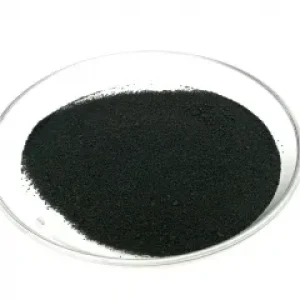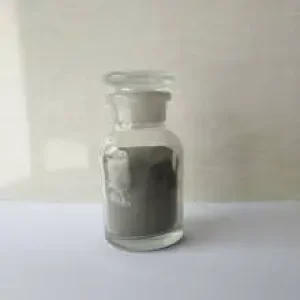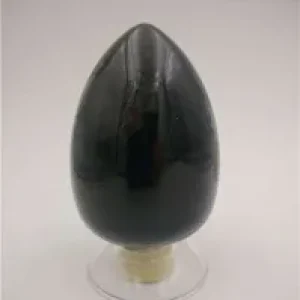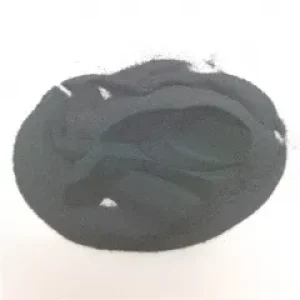Overview of Boron Carbide B4C Powder
Boron carbide (chemical formula B4C) is an extremely hard boron carbon ceramic and covalent material, usually gray-black micro powder, commonly used in tank armor, bulletproof vests, engine damage powder, and many industrial applications. The Vickers hardness is greater than 30 GPa, one of the hardest materials known after cubic boron nitride and diamond. Boron carbide is the third hardest known substance, second only to diamond and cubic boron nitride, so it is called “black diamond.”
Boron carbide is a strong material with extremely high hardness (approximately 9.5 to 9.75 on the Mohs hardness scale). It is used to absorb neutrons with a high cross-section (a good shielding performance against neutrons) and is resistant to ionization. The stability of radiation and most chemicals. Its Vickers hardness (38 GPa), elastic modulus (460 GPa), and fracture toughness (3.5 MPa·m1 / 2) are close to the corresponding values of the diamond (1150 GPa and 5.3 MPa·m1 / 2).
Boron carbide is a semiconductor whose electronic properties are dominated by jump-type transmission. The energy bandgap depends on the composition and the degree of order. The bandgap is estimated to be 2.09 eV, with multiple intermediate bandgap states, complicating the photoluminescence spectrum. The material is usually p-type.
Boron carbide was discovered in the 19th century as a by-product of metal boride research and was not scientifically studied until the 1930s.
Boron carbide can absorb many neutrons without forming any radioisotopes, so it is an ideal neutron absorber in nuclear power plants, and the neutron absorber mainly controls the rate of nuclear fission. In addition, compared with diamond and cubic boron nitride, boron carbide is easy to manufacture and low in cost, so it is more widely used. It can replace expensive diamonds in some places and is commonly used in grinding, grinding, and drilling.
Technical parameter of Boron carbide B4C powder
Boron Carbide Nanoparticles (B4C)
Crystal phase: Hexagonal
APS: 45-55nm
SSA: 40-60m2/g
Zeta Potential: -26mV
Bulk density: 0.10g/cm3
Purity: >99%
Color: Black
Making Method: Plasma vapor-phase synthesis method
Specifications of Boron Carbide B4C Powder
|
B |
C | O | N | Si | Fe | Ni |
| 77.48% | 21.52% | <0.1% | <0.08% | <0.1% | <0.1% |
<0.01% |
Production Method of Boron Carbide B4C Powder
Boron Carbide B4C Carbide powder is produced by reducing boron oxide with carbon at high temperatures in an electric furnace. The carbothermic reduction method usually uses boric acid or boric anhydride as the raw material and carbon as the reducing agent. The high-temperature reduction reaction is carried out in an electric arc furnace. At present, the carbothermic reduction method is the main method for industrial production of boron carbide, which has the advantages of simple reaction and low cost. In addition, there are self-propagating thermal reduction methods, mechanochemical methods, direct synthesis methods, and sol-gel methods for preparing boron carbide.
Boron carbide was first synthesized by Henri Moissan in 1899. Boron trioxide was reduced with carbon or magnesium in the presence of carbon in an electric arc furnace. In the case of carbon, the reaction occurs at a temperature higher than the melting point of B4C, accompanied by the release of large amounts of carbon monoxide:
2 B2O3 + 7 C→B4C + 6 CO
If magnesium is used, the reaction can be carried out in a graphite crucible, and the magnesium by-product can be removed by treatment with acid.
Application of Boron Carbide B4C Powder
Boron carbide due to low density, large strength, high-temperature stability, and good chemical stability. In wear-resistant materials, ceramic reinforcement phase, especially in light decoration, reactor neutron absorbers, etc.
Fine and advanced abrasive materials
Because of the high grinding efficiency of boron carbide, it is mainly used as a grinding medium in the grinding process of materials, such as grinding, grinding, drilling, and polishing of hard materials such as gems, ceramics, knives, bearings, and cemented carbides.
Industrial ceramic materials
Products made of boron carbide powder: sandblasting nozzles, sealing rings, nozzles, bearings, plungers of mud pumps, pestles and rocket launchers, ceramic coatings for warships, helicopters, etc., as a new type of material. It has a high melting point, hardness, elastic modulus, strong wear resistance, and good self-lubricating properties. It is widely used in sandblasting machinery, electronics, information, aerospace, automobile, and other industries.
Shielding and control materials for the nuclear industry
Boron carbide material has a large thermal neutron capture section, excellent neutron absorption, and radiation resistance. It is internationally recognized and recommended as a nuclear reactor control and shielding material.
Bulletproof armor
Due to its high strength and small specific gravity, it is especially suitable for use in lightweight bulletproof armor, such as protecting aircraft, vehicles, ships, and human bodies.
Improve the life of mechanical parts.
Combine boron carbide powder with metal to produce metal-based alloy powder. After special surface treatment of this material, the original mechanical parts are more wear-resistant and corrosion-resistant to acid and alkali.
Special absorber provides energy.
Boron carbide, also known as “black gold,” is used as a power source in powder form as a solid fuel for the rocket.
Chemical industry additives
Due to its stable chemical properties, boron carbide does not react with acid and alkali solutions. Its high chemical potential is widely used to produce other boron-containing materials, such as zirconium boride and titanium boride.
Advanced refractories
Because of its anti-oxidation and high-temperature resistance, boron carbide is used as a high-grade shaped and unshaped refractory material and is widely used in various fields of metallurgy, such as steel stoves and kiln furniture.
Company Profile
My Carbides is a trusted global chemical material supplier & manufacturer with over 12-year-experience in providing super high-quality carbides and relatives products.
The company has a professional technical department and Quality Supervision Department, a well-equipped laboratory, and equipped with advanced testing equipment and after-sales customer service center.
If you are looking for high-quality Carbides, please feel free to contact us or click on the needed products to send an inquiry.
Storage Condition of Boron Carbide B4C Powder
Damp reunion will affect B4C powder dispersion performance and using effects, therefore, boron carbide B4C powder should be sealed in vacuum packing and stored in cool and dry room, the boron carbide B4C powder can not be exposure to air. In addition, the boron carbide B4C powder should be avoided under stress.
Payment Methods of Boron Carbide B4C Powder
L/C, T/T, Western Union, Paypal, Credit Card etc.
Shipment of Boron Carbide B4C Powder
It could be shipped by sea, by air, or by reveal ASAP as soon as repayment receipt.
Package of Boron Carbide B4C Powder
Vacuum packing, 100g, 500g or 1kg/bag, 25kg/barrel, or as your request.
FAQ
Q1: What is the hardness of boron carbide powder?
Answer: The hardness of boron carbide powder is very high, second only to diamond and cubic boron nitride, and is one of the hardest substances known.
Q2: Is boron carbide powder harmful to the human body?
Answer: Yes, boron carbide powder is harmful to the human body. It is highly irritating and may cause symptoms such as itching, redness, and swelling in areas of skin contact. Long-term inhalation of boron carbide powder may also cause damage to the lungs. Therefore, when handling boron carbide powder, protective clothing and respirators should be worn and the workplace should be well ventilated.
Q3: What is the melting point of boron carbide powder?
Answer: The melting point of boron carbide powder is very high, about 2450°C.
Q4: What are the sintering characteristics of boron carbide powder?
Answer: Boron carbide is a typical covalent bond compound with a high percentage of covalent bonds, resulting in a narrow sintering temperature range. Even if pure boron carbide powder is sintered at a high temperature close to the melting point, there is less material migration. The density of the resulting sintered body is usually low, and abnormal grain growth and surface melting are prone to occur.
Q5: What effect does the particle size of boron carbide powder have on its performance?
Answer: The particle size of boron carbide powder has a significant impact on its performance. Problems such as wide particle size distribution, irregular shape, rough surface and uneven quality will affect the sintering effect and performance of boron carbide products, thus hindering their wide application.










